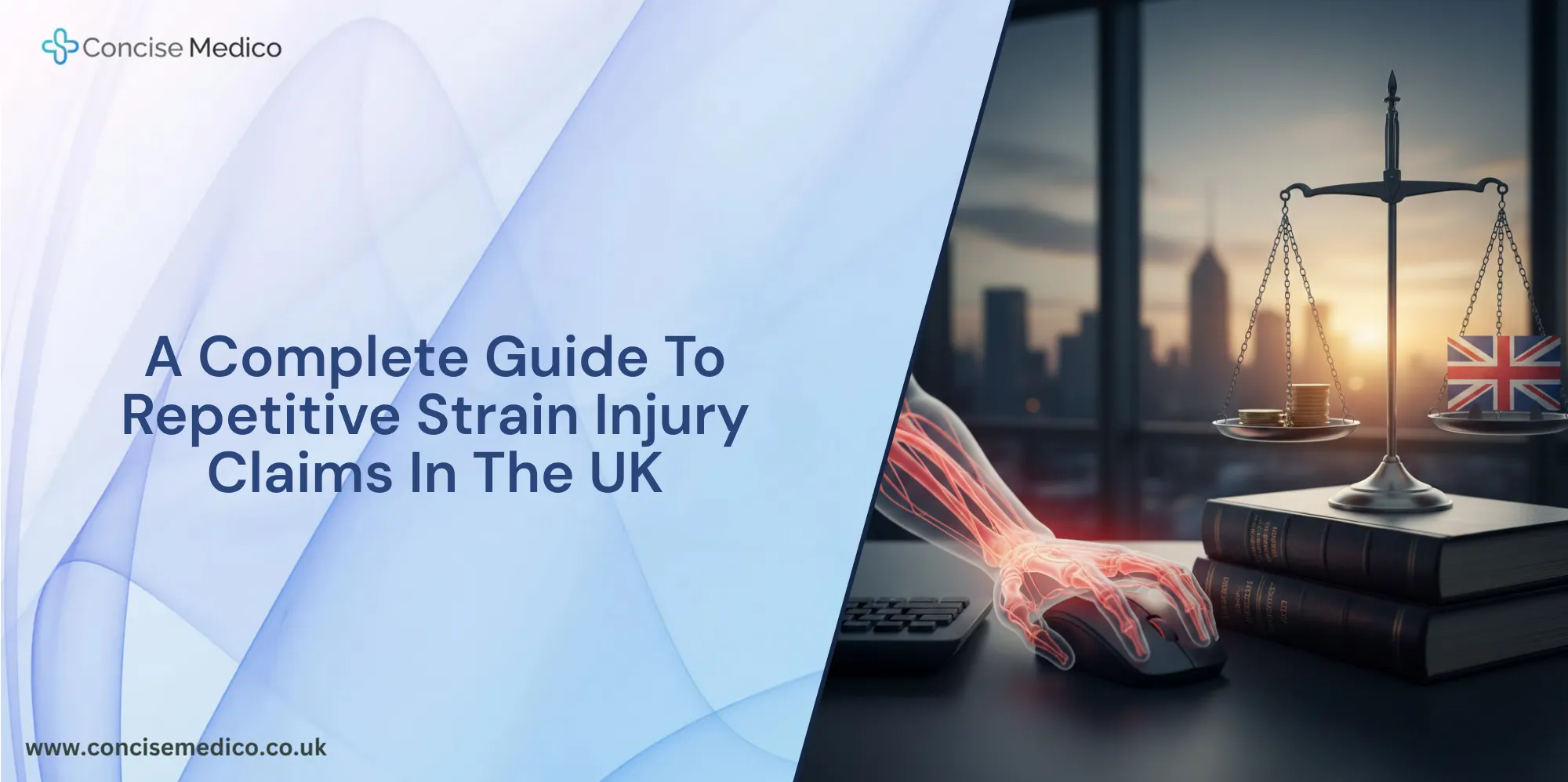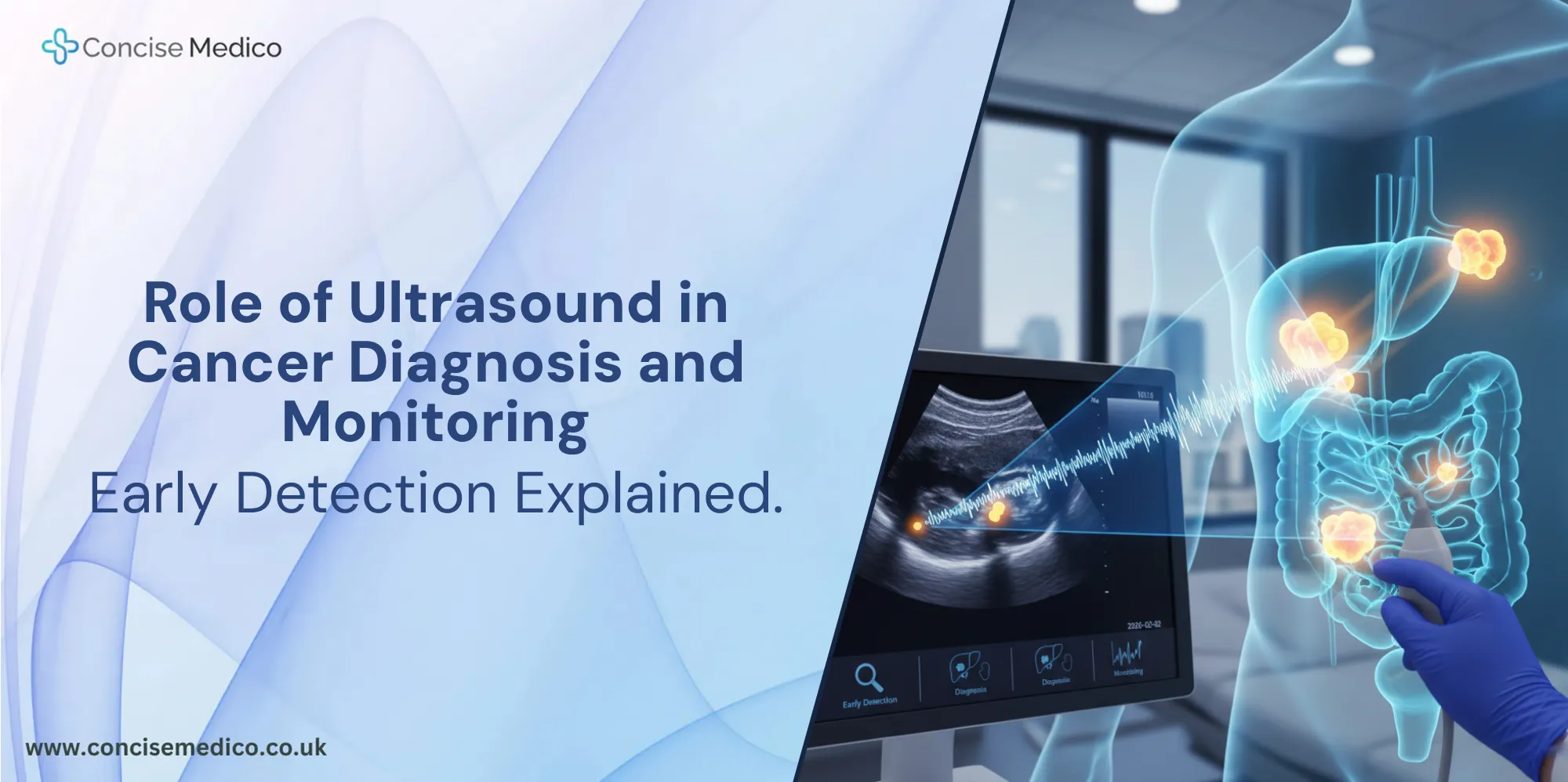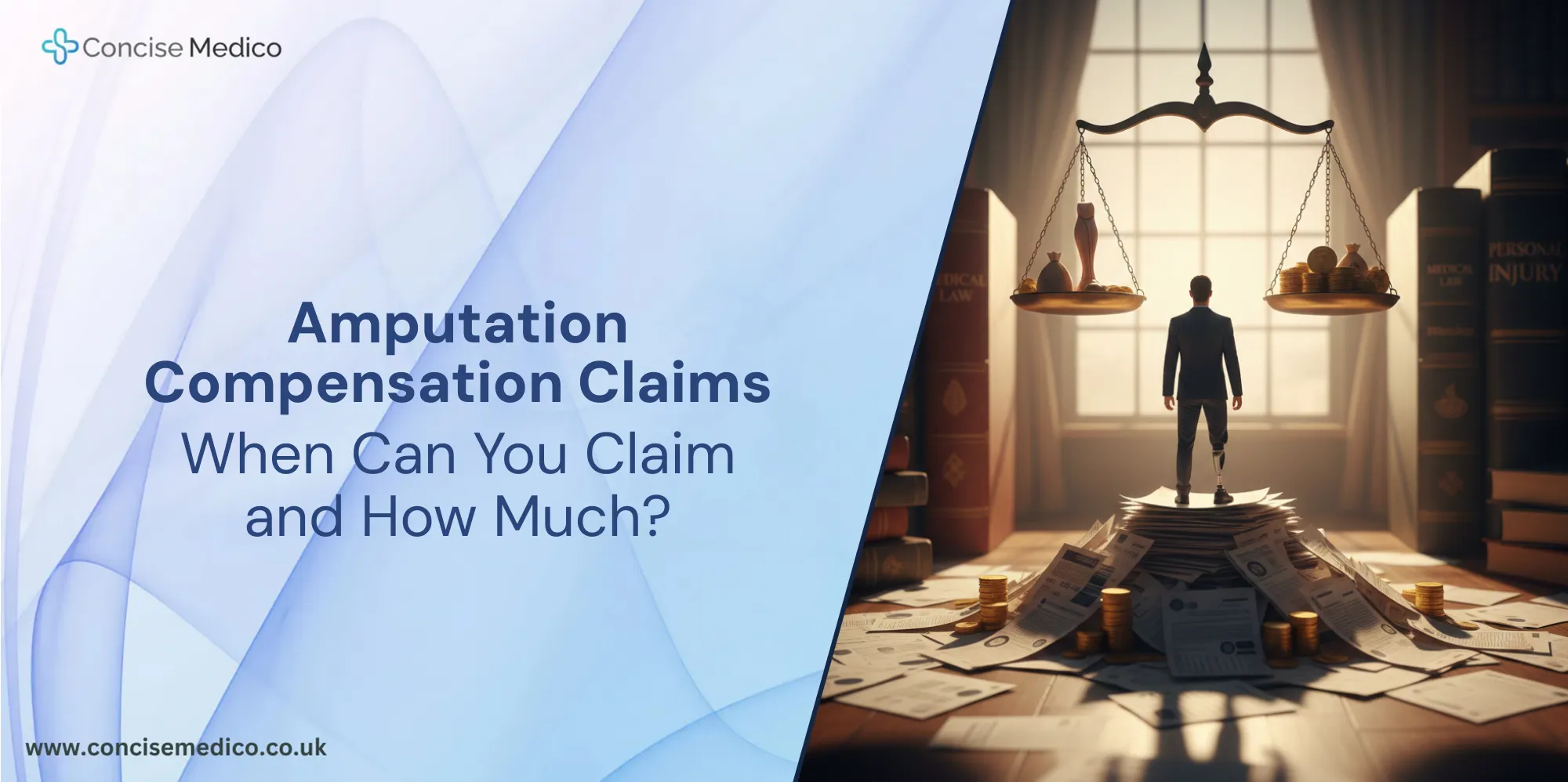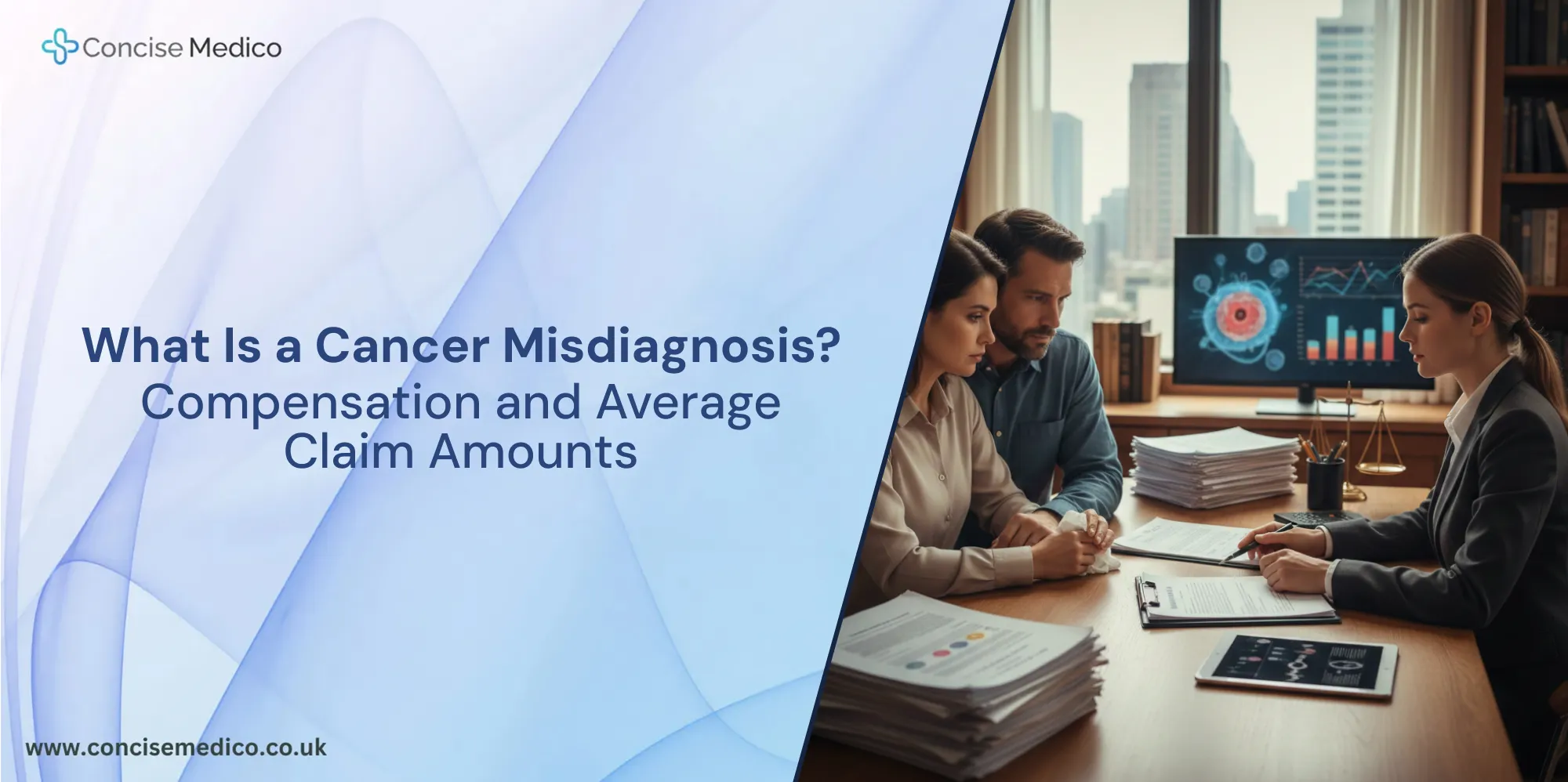TABLE OF CONTENT
- What Is an Expert Witness Psychologist?
- How to Become an Expert Witness Psychologist
- Key Responsibilities of an Expert Witness Psychologist
- Common Challenges
- Are you looking for a court-appointed psychologist in the UK?
- FAQs
To become an expert witness psychologist is a fulfilling job. It uses psychology skills to help the legal system. Psychologists as expert witnesses bring expertise to cases, helping courts make wise verdicts. They study mental health problems and offer expert advice on how to become an expert witness psychologist and contribute effectively. A review points out that 29.3% forensic and 62.1% clinical psychologists often work as expert witnesses in UK courts. They perform an integral role in criminal, family, and civil law cases. Evidence suggests that psychologist testimony is essential. It influences verdicts and helps ensure fair legal decisions. As the need for psychological insights in courtrooms is increasing. If you become an expert witness psychologist, it offers a unique opportunity. You can support the legal system and propel your career alongside it.
What Is an Expert Witness Psychologist?
A psychologist expert witness shares unbiased views in legal disputes. They turn hard ideas into clear advice. Courts rely on them to understand mental health issues. Their work covers five key areas:
- Assessing mental competency in legal cases
- Evaluating psychological injury claims
- Conducting child custody evaluations
- Providing forensic psychological insights
- Giving expert testimony in court
As explained by the Crown Prosecution Service (CPS),
“The duty of an expert witness is to help the court to achieve the overriding objective by giving an opinion which is objective and unbiased, in relation to matters within their expertise.”
CPS.Gov.UK
These experts simplify complex details. This makes it easy for non-experts to understand.
How to Become an Expert Witness Psychologist
1. Get the Right Qualifications
To how to become an expert witness psychologist, start with formal study:
-
Postgraduate Degree
Get a master’s or doctorate in psychology. This shows you know your field well. It also meets the minimum education rules for expert work.
-
Specialist Training
Choose forensic, clinical or neuropsychology as your focus. These paths teach skills courts need. They also prepare you for real-world cases.
-
Professional Registration
Join the HCPC or BPS. These bodies check if you meet high standards. They also give you a code of ethics to follow.
-
Continued Learning
Take CPD courses each year. They keep you updated with new practices. They also show you want to stay sharp in your role.
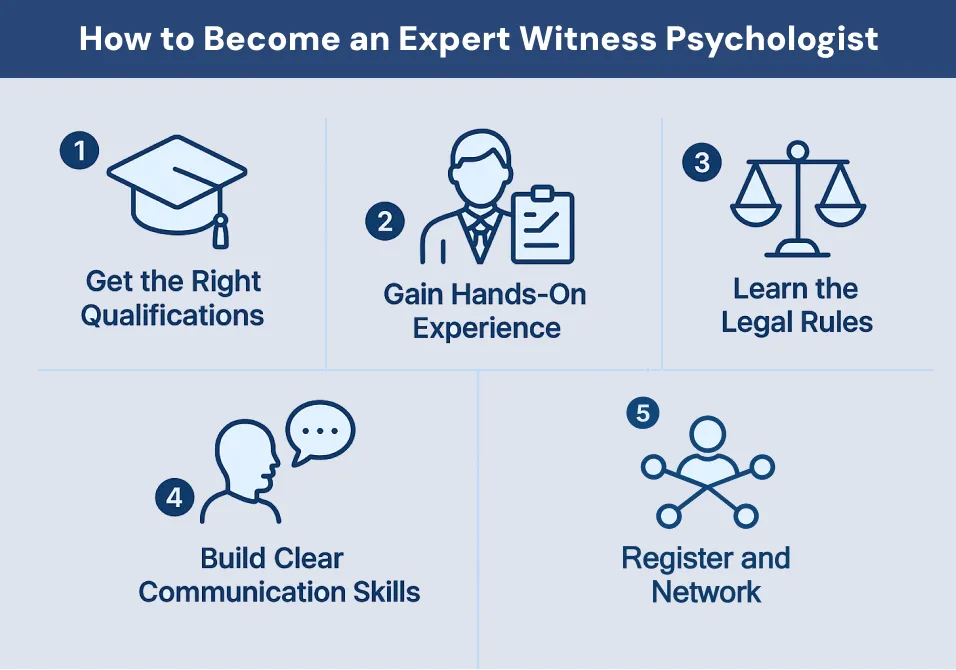
2. Gain Hands-On Experience
Courts trust psychology experts who have real skills. You can build these by:
-
Forensic Settings
Work in secure units or youth remand centres. You meet offenders and assess risk. You learn to handle people who may be unstable.
-
Clinical Assessments
Test patients in hospitals or clinics. You use structured tools to measure mood and thought. These sessions teach you clear reporting skills.
-
Mental Health Evaluations
Visit community centres or GP surgeries. You assess anxiety, depression and other issues. You learn to connect symptoms with life events.
-
Courtroom Observation
Sit in on trials as an observer. You watch other expert witnesses give evidence. You note their style, tone and language. This helps you shape your own approach.
3. Learn the Legal Rules
You do not need a law degree to become an expert witness psychologist, but you must know court rules:
-
Civil Procedure Rules (CPR Part 35)
Learn how to prepare expert reports for civil cases. You must follow clear formats. This rule sets out how your work fits the process.
-
Family Procedure Rules (FPR Part 25)
Learn how to report in family law cases. This covers child welfare and custody. You use a child-centred approach here.
-
Criminal Procedure Rules (CrimPR Part 33)
Learn how to handle evidence in criminal trials. You must know what you can say in open court. You also learn about disclosure rules.
-
Ethical Duties
As a court appointed psychologist, your main duty is to the court. You must stay neutral and honest. You must not favour the hiring party.
4. Build Clear Communication Skills
If you want to become an expert witness psychologist focus on explaining your views simply:
-
Plain Reports
Write with short sentences. Use bullet lists and clear headings. Avoid jargon or long words. This helps judges and juries follow you.
-
Voice and Tone
Speak slowly and clearly in mock trials. Record yourself to spot any filler words. Practice staying calm if a lawyer challenges you.
-
Question Handling
Prepare lines to answer tough questions. Keep replies direct and on point. Say “I don’t know” if you lack data, rather than guess.
-
Visual Aids
Use simple charts or diagrams if needed. Show test results in easy-to-read tables. Visuals can make your point faster.
5. Register and Network
To be found as an expert witness psychologist, you must be visible:
-
Expert Directories
List yourself on sites where lawyers search. Update your profile with fresh experience and publications.
-
Professional Bodies
Join forensic psychology groups and attend their events. Present short talks or workshops if you can.
-
Legal Networking
Meet solicitors, barristers and judges. Offer to give free seminars on psychology in law. These contacts lead to real work.
-
Mock Trials
Volunteer with law schools or legal charities. These practice sessions help you build confidence. They also give you a track record.
Key Responsibilities of an Expert Witness Psychologist
1. Mental Competency Checks
You test if someone can understand trial steps. You interview them and use simple scales. You report if they can make decisions.
Learn more about mental assessments in the UK
2. Psychological Injury Reports
You link emotional harm to past events. You use tools like the Beck Depression Inventory. You write a clear cause-and-effect narrative.
Read more about: Psychological Injury
3. Child Custody Advice
You assess each parent’s ability to care for a child. You observe play and daily routines. You highlight any risk or strength you see.
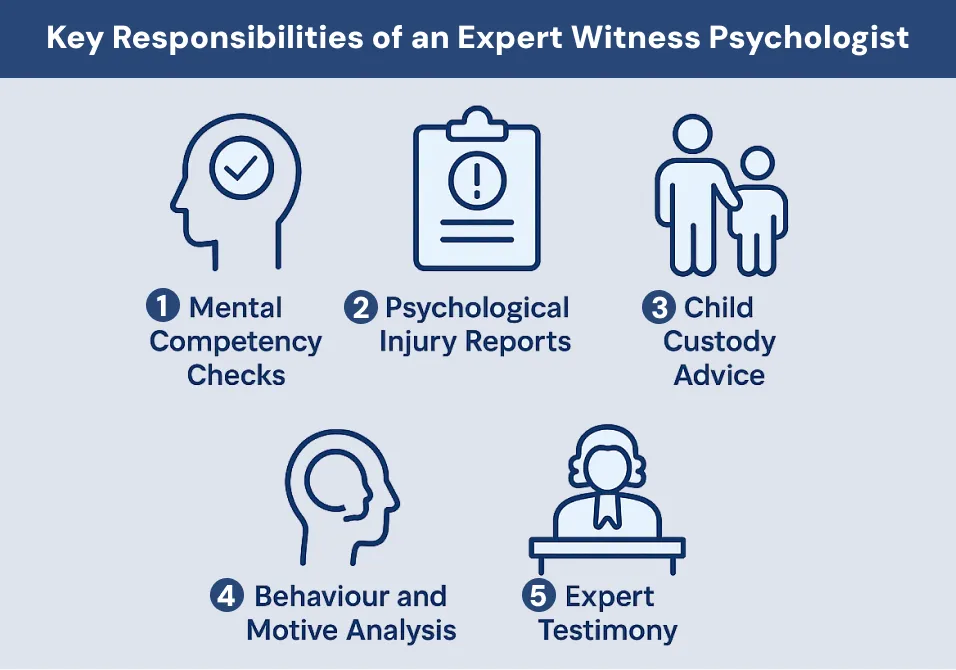
4. Behaviour and Motive Analysis
You study crime scene notes and offender history. You look at mindset and triggers. You point out factors that led to the act.
5. Expert Testimony
You present and explain your findings in court, answering questions from lawyers and the judge. You translate technical assessments into clear language so the court can use your opinions when making decisions.
Common Challenges
-
Cross-Examination Stress
Lawyers will push you hard to spot weaknesses. You must stay calm and stick to the facts. Practice with colleagues to build courage.
-
Staying Neutral
You owe your duty to the court, not to any side. You must resist pressure from instructing lawyers. Your honesty keeps your reputation sound.
-
Ethical Dilemmas
You follow mental health ethics and legal rules at once. Patient confidentiality may clash with court demands. Clear policies and advice lines help you choose right.
-
Ongoing Learning
Rules and tests change over time. Read journals and attend seminars yearly. This keeps you up to date as a court appointed psychologist.
Are you looking for a court-appointed psychologist in the UK?
Concise Medico helps you become an expert witness psychologist by offering expert psychological assessments, detailed reports, and professional testimony services. Reach out to us today.
We can link you to top psychologists who serve as expert witnesses in legal cases.
FAQs
To become an expert witness psychologist is a fulfilling job. It uses psychology skills to help the legal system. Psychologists as expert witnesses bring expertise to cases, helping courts make wise verdicts. They study mental health problems and offer expert advice on how to become an expert witness psychologist and contribute effectively. A review points out that 29.3% forensic and 62.1% clinical psychologists often work as expert witnesses in UK courts. They perform an integral role in criminal, family, and civil law cases. Evidence suggests that psychologist testimony is essential. It influences verdicts and helps ensure fair legal decisions. As the need for psychological insights in courtrooms is increasing. If you become an expert witness psychologist, it offers a unique opportunity. You can support the legal system and propel your career alongside it.
What Is an Expert Witness Psychologist?
A psychologist expert witness shares unbiased views in legal disputes. They turn hard ideas into clear advice. Courts rely on them to understand mental health issues. Their work covers five key areas:
- Assessing mental competency in legal cases
- Evaluating psychological injury claims
- Conducting child custody evaluations
- Providing forensic psychological insights
- Giving expert testimony in court
As explained by the Crown Prosecution Service (CPS),
“The duty of an expert witness is to help the court to achieve the overriding objective by giving an opinion which is objective and unbiased, in relation to matters within their expertise.”
CPS.Gov.UK
These experts simplify complex details. This makes it easy for non-experts to understand.
How to Become an Expert Witness Psychologist
1. Get the Right Qualifications
To how to become an expert witness psychologist, start with formal study:
-
Postgraduate Degree
Get a master’s or doctorate in psychology. This shows you know your field well. It also meets the minimum education rules for expert work.
-
Specialist Training
Choose forensic, clinical or neuropsychology as your focus. These paths teach skills courts need. They also prepare you for real-world cases.
-
Professional Registration
Join the HCPC or BPS. These bodies check if you meet high standards. They also give you a code of ethics to follow.
-
Continued Learning
Take CPD courses each year. They keep you updated with new practices. They also show you want to stay sharp in your role.

2. Gain Hands-On Experience
Courts trust psychology experts who have real skills. You can build these by:
-
Forensic Settings
Work in secure units or youth remand centres. You meet offenders and assess risk. You learn to handle people who may be unstable.
-
Clinical Assessments
Test patients in hospitals or clinics. You use structured tools to measure mood and thought. These sessions teach you clear reporting skills.
-
Mental Health Evaluations
Visit community centres or GP surgeries. You assess anxiety, depression and other issues. You learn to connect symptoms with life events.
-
Courtroom Observation
Sit in on trials as an observer. You watch other expert witnesses give evidence. You note their style, tone and language. This helps you shape your own approach.
3. Learn the Legal Rules
You do not need a law degree to become an expert witness psychologist, but you must know court rules:
-
Civil Procedure Rules (CPR Part 35)
Learn how to prepare expert reports for civil cases. You must follow clear formats. This rule sets out how your work fits the process.
-
Family Procedure Rules (FPR Part 25)
Learn how to report in family law cases. This covers child welfare and custody. You use a child-centred approach here.
-
Criminal Procedure Rules (CrimPR Part 33)
Learn how to handle evidence in criminal trials. You must know what you can say in open court. You also learn about disclosure rules.
-
Ethical Duties
As a court appointed psychologist, your main duty is to the court. You must stay neutral and honest. You must not favour the hiring party.
4. Build Clear Communication Skills
If you want to become an expert witness psychologist focus on explaining your views simply:
-
Plain Reports
Write with short sentences. Use bullet lists and clear headings. Avoid jargon or long words. This helps judges and juries follow you.
-
Voice and Tone
Speak slowly and clearly in mock trials. Record yourself to spot any filler words. Practice staying calm if a lawyer challenges you.
-
Question Handling
Prepare lines to answer tough questions. Keep replies direct and on point. Say “I don’t know” if you lack data, rather than guess.
-
Visual Aids
Use simple charts or diagrams if needed. Show test results in easy-to-read tables. Visuals can make your point faster.
5. Register and Network
To be found as an expert witness psychologist, you must be visible:
-
Expert Directories
List yourself on sites where lawyers search. Update your profile with fresh experience and publications.
-
Professional Bodies
Join forensic psychology groups and attend their events. Present short talks or workshops if you can.
-
Legal Networking
Meet solicitors, barristers and judges. Offer to give free seminars on psychology in law. These contacts lead to real work.
-
Mock Trials
Volunteer with law schools or legal charities. These practice sessions help you build confidence. They also give you a track record.
Key Responsibilities of an Expert Witness Psychologist
1. Mental Competency Checks
You test if someone can understand trial steps. You interview them and use simple scales. You report if they can make decisions.
Learn more about mental assessments in the UK
2. Psychological Injury Reports
You link emotional harm to past events. You use tools like the Beck Depression Inventory. You write a clear cause-and-effect narrative.
Read more about: Psychological Injury
3. Child Custody Advice
You assess each parent’s ability to care for a child. You observe play and daily routines. You highlight any risk or strength you see.

4. Behaviour and Motive Analysis
You study crime scene notes and offender history. You look at mindset and triggers. You point out factors that led to the act.
5. Expert Testimony
You present and explain your findings in court, answering questions from lawyers and the judge. You translate technical assessments into clear language so the court can use your opinions when making decisions.
Common Challenges
-
Cross-Examination Stress
Lawyers will push you hard to spot weaknesses. You must stay calm and stick to the facts. Practice with colleagues to build courage.
-
Staying Neutral
You owe your duty to the court, not to any side. You must resist pressure from instructing lawyers. Your honesty keeps your reputation sound.
-
Ethical Dilemmas
You follow mental health ethics and legal rules at once. Patient confidentiality may clash with court demands. Clear policies and advice lines help you choose right.
-
Ongoing Learning
Rules and tests change over time. Read journals and attend seminars yearly. This keeps you up to date as a court appointed psychologist.
Are you looking for a court-appointed psychologist in the UK?
Concise Medico helps you become an expert witness psychologist by offering expert psychological assessments, detailed reports, and professional testimony services. Reach out to us today.
We can link you to top psychologists who serve as expert witnesses in legal cases.
